芒果云接嗎
Would you like to know how your mood impact your sleep and how your parents influence your happiness levels?
您想知道您的心情如何影響您的睡眠以及您的父母如何影響您的幸福感嗎?
Become a data nerd, and track it!
成為數據書呆子,并對其進行跟蹤!
on這到底是什么? (又名數據源) (🤔 What on earth is all this? (aka data sources))
In October 2018 I started tracking several metrics about myself.
在2018年10月,我開始跟蹤有關自己的幾個指標。
Every day I score my mood, sleep, vitamins I’m taking, and many other variables. Later, I also implemented a weekly review practice to log average times spent on different activities (e.g. work time), gratefulness, favourite quotes etc.
每天我都會為自己的心情,睡眠,所服用的維生素以及許多其他變量評分。 后來,我還實施了每周的檢查練習,以記錄在不同活動上花費的平均時間(例如工作時間),感激之情,喜歡的報價等。
Data Collection
數據采集
The daily and weekly reviews were logged in using online forms—daily one filled in the evening or morning the next day, weekly at the end of every Sunday. Starting from Google Forms in 2018, I then moved the forms to Coda and, in early 2020, to Airtable.
每天和每周的評論都使用在線表格登錄-每天在第二天的晚上或第二天的早晨填寫評論,每周一次在每個星期日結束。 從2018年的Google Forms開始,我將表單移至Coda,并于2020年初移至Airtable。
Weekly activity data (e.g. time spent on paid work, or self-improvement) were tracked daily using Toggl. The sums from the week were logged in at the end of the week.
每天使用Toggl跟蹤每周的活動數據(例如花在有償工作或自我完善上的時間)。 該周的總和在該周結束時登錄。
Sleep data–duration of deep sleep and the total sleep time—were tracked using an Oura ring, with a weekly average logged at the end of the week.
睡眠數據–深度睡眠的持續時間和總睡眠時間–使用Oura環進行跟蹤,并在一周結束時記錄每周平均值。
In mid-2020 I accumulated enough data, or rather enough data analytical skills to investigate the results. Are there any patterns? Correlations? What’s the coolest looking chart I can plot?
在2020年中期,我積累了足夠的數據,或者說是足夠的數據分析技能來調查結果。 有沒有模式? 相關性? 我能繪制出的最酷的圖表是什么?
This post below is a human-friendly summary of the process, stand-out results, and the nicest charts. 👌
下面的帖子是對流程 ,出色的結果和最好的圖表的人性化總結 。 👌
The full Jupyter notebook includes a list of many ideas for further analysis.
完整的Jupyter筆記本包含許多想法的列表,需要進一步分析。
讓我們得到數字:數據訪問 (Let’s get the numbers: data access)
You can access the freshest version of the data using the Airtable API, and this awesome Python wrapper.
您可以使用Airtable API和該功能強大的Python包裝器訪問數據的最新版本。
We do the same with the data frame with weekly stats and, voila, we have two pandas data frames to work with.
我們對具有每周統計信息的數據框進行同樣的操作, 瞧,我們有兩個可處理的熊貓數據框。
Let’s see what they can tell us.
讓我們看看他們能告訴我們什么。
🆙跌宕起伏和皮爾遜 (🆙 Ups, downs, and Pearson)
With all the mood data we can plot some delightful charts.
利用所有的情緒數據,我們可以繪制一些令人愉快的圖表。
For instance, here is a function that plots two chosen moods over a selected number of days.
例如,這是一個在選定的天數內繪制兩個選定的情緒的函數。
Output:
輸出:
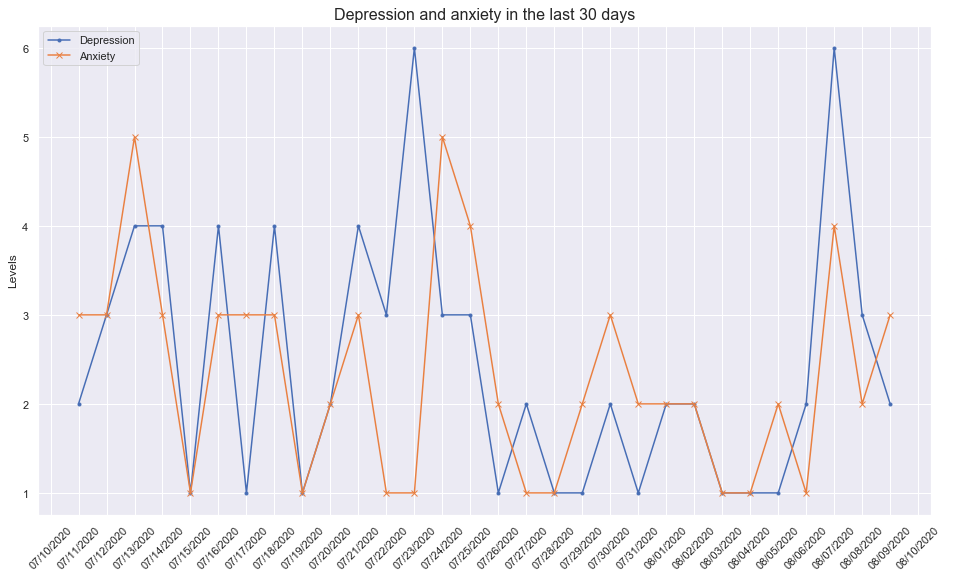
This is nice to visualise a period, but to see wider trends we can turn to statistics. In comes our best friend Pearson 🙌. I could just summarise the top values, but a correlation matrix is just tooooo pretty not to show.
可以很形象地看到一個時期,但是要查看更廣泛的趨勢,我們可以轉向統計。 我們最好的朋友皮爾森(Pearson) 我只可以總結出最高值,但是相關矩陣只是不顯示而已 。
Output:
輸出:
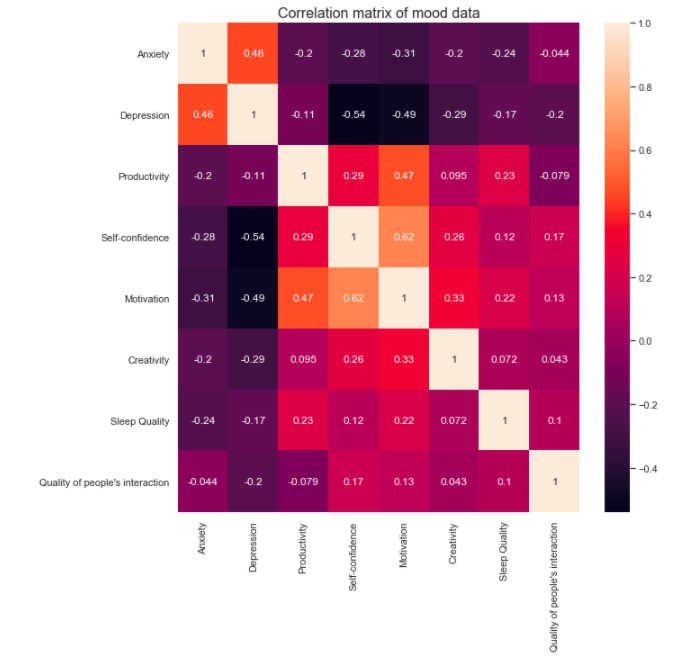
Following the standard benchmark values (above 0.5, and below -0.5— medium positive/negative correlation, above 0.7 or below -0.7—strong positive/negative correlation) there are no strong correlations.
遵循標準基準值(高于0.5且低于-0.5-中等正/負相關,高于0.7或低于-0.7-強烈正/負相關),則沒有強相關性。
Here is a function to pick and display correlations above 0.5 and below -0.5, I’m running it here with the number of days equal to the length of the data frame to get values form the whole dataset.
這是一個選擇并顯示高于0.5且低于-0.5的相關性的函數,我在這里運行它的天數等于數據幀的長度,以獲取整個數據集的值。
Output:
輸出:

What does it tell us? Nothing out of ordinary, really.
它告訴我們什么? 真的沒有什么不尋常的。
- As self-confidence goes down, my depression levels increase, and the reverse: as depression does down self-confidence increases. 隨著自信心的下降,我的抑郁水平增加,反之:隨著抑郁的下降,自信心也增加。
- The same relationship exists between motivation and depression. 動機與抑郁之間存在相同的關系。
Additionally, self-confidence and motivation are positively correlated with each other—as ones does up so does the other. Nothing that surprising.
此外, 自信和動力之間正相關,彼此之間正相關 。 沒什么奇怪的。
I was however expecting sleep quality to be more strongly correlated with mood, which doesn’t seem to be the case.
但是,我期望睡眠質量與情緒更加緊密相關,但事實并非如此。
my我最幸福的城市是哪里? (🌇 What’s my happiest city?)
I’ve travelled a lot in the last 648 days, and was curious to see whether and how the location impacted my mood.
在過去的648天里,我旅行了很多次,很想知道這個地點是否以及如何影響了我的心情。
All these results need to be taken with a bowl of salt — the number of observations from each location is not the same.
所有這些結果都需要用一碗鹽來獲取-每個位置的觀測次數都不相同。
There were several cities in which I spent only ~1 week. This typically meant I was there for holiday or a special event, so the daily setup and routine were not comparable with long term stay. I eliminated these rows from the analysis.
我在幾個城市只花了大約1周的時間。 這通常意味著我要去度假或參加特殊活動,因此日常設置和日常活動無法與長期住宿相提并論。 我從分析中刪除了這些行。
To get the top average mood values by city, we just use group by and extract the min and max values.
要獲得城市最高的平均情緒值,我們只使用group by并提取最小值和最大值。
Output:
輸出:

Looks like I should sleep in Warsaw, and for productivity go to Chiang Mai — that’d be a bit of a long commute. 🤷?♀?
看來我應該在華沙睡覺,要提高生產力,就要去清邁-這將是一個漫長的通勤時間。 ♀?
Output:
輸出:

Most of the mood data matches with the reports of my remembering self, except for productivity values being low in Paris. I don’t remember it being this way.
大多數情緒數據與我記憶中的自我報告相符,但巴黎的生產力值較低。 我不記得是這樣的。
What’s interesting to notice that minimum productivity, minimum depression as well as maximum creativity were observed in the same city, Paris. And this is not how I remember this stay — I wouldn’t say it was below average productive, or in any way more creative.
有趣的是,在同一城市巴黎觀察到了最低的生產率,最低的壓抑以及最大的創造力 。 這不是我記得的時光-我不會說這低于平均水平的生產力,或者說是更有創造力的。
📍最繁忙的城市是… (📍 And the most workaholic city is…)
Work and feeling productive aren’t the same thing. But, guess what? Someone was scrupulous enough to track the time spent on different activities during the week.
工作和生產力并不相同。 但猜猜怎么了? 有人認真地跟蹤一周中花費在不同活動上的時間。
Working with datetime is a mess—you can see all my attempts in the notebook—for this post I’ll stick to float values. Let’s see highest and lowest values for the main activities I track daily—paid work, self-improvement, and life organising.
使用日期時間是一團糟-您可以在筆記本上看到我的所有嘗試-對于這篇文章,我將堅持浮動值。 讓我們看看我每天跟蹤的主要活動的最高和最低值,即有酬工作,自我完善和生活組織。
Output:
輸出:

Looks like the most “productive” city, Chiang Mai, was not the one where I spent most time on work. Likewise, spending many hours on work in Lisbon didn’t make me feel very productive.
看起來像是“生產力最高”的城市清邁,并不是我花大量時間在工作上的城市。 同樣,在里斯本花很多時間工作并沒有使我感到非常有生產力。
How about a chart to visualise these duration values and show how much of an outlier Lisbon was.
圖表如何可視化這些持續時間值并顯示里斯本有多少離群值 。
Output:
輸出:
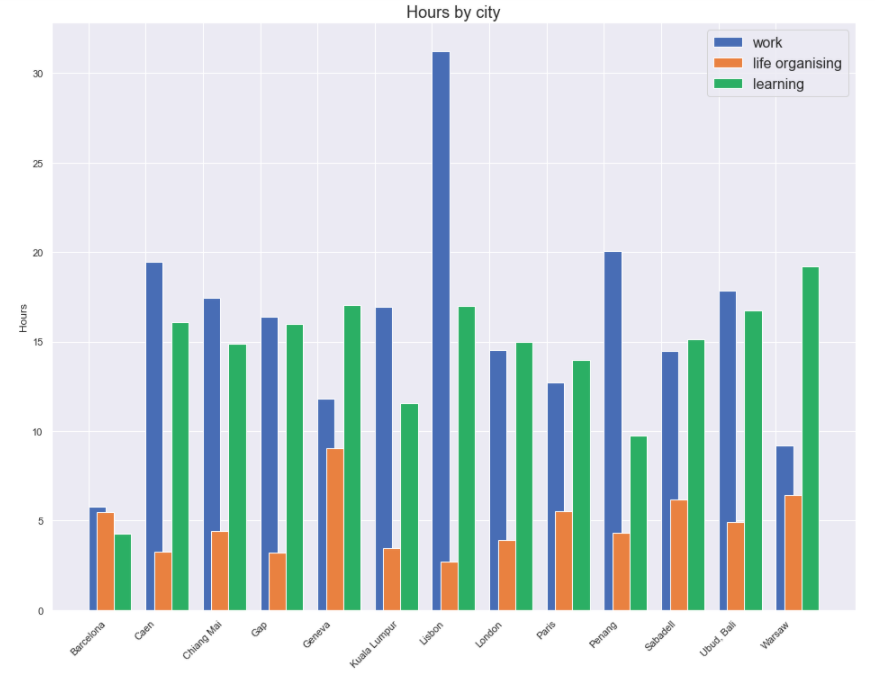
For context, I spent the time in Lisbon without my partner, and was very isolated. My interpretation:
就上下文而言,我在沒有伴侶的情況下在里斯本度過了時光,并且非常孤立。 我的解釋:
A lack of social interaction leads to overwork, without even a positive subjective feeling of productivity.
缺乏社交互動會導致工作過度,甚至沒有積極的主觀生產力感覺。
What a waste, don’t do it at home. ??
真是浪費,不要在家中做。 ??
I我在哪里睡得最長? (💤 Where did I sleep the longest?)
The self-reported sleep quality was highest in Warsaw and smallest in Penang. How does it square with the sleep length? As a reminder: total sleep and deep sleep values were tracked using an Oura ring.
自我報告的睡眠質量在華沙最高,在檳城最低。 它與睡眠時間如何平方? 提醒一下: 總睡眠和深度睡眠值 使用Oura戒指追蹤
Here is a plot of sleep duration values per city.
這是每個城市的睡眠持續時間值圖。
Output:
輸出:
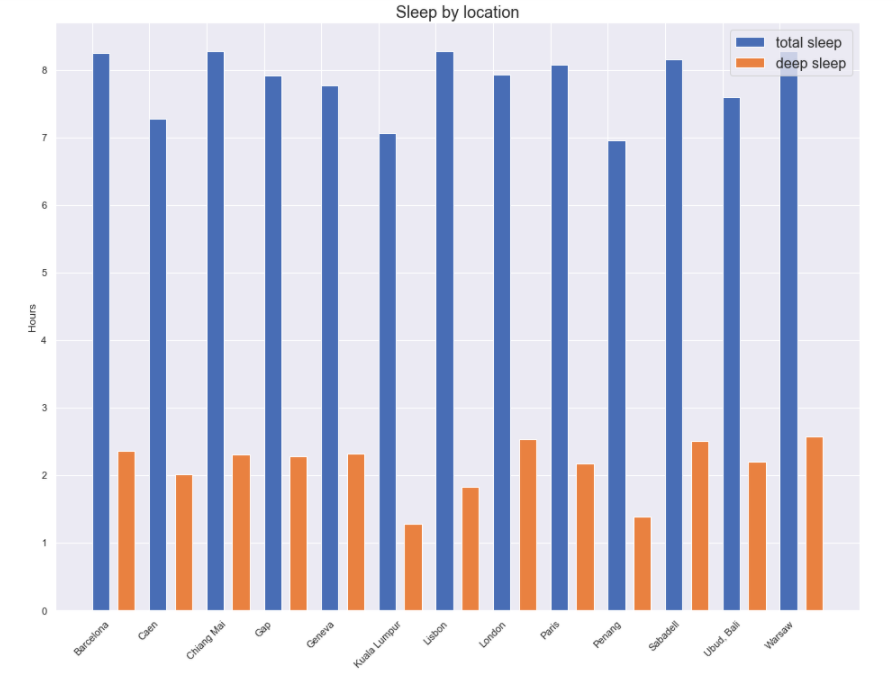
It’s not very clear which are the top and bottom values. I managed to convert the sleep values from floats to hours.
不清楚哪個是最高值和最低值。 我設法將睡眠值從浮點數轉換為小時數。
Output:
輸出:
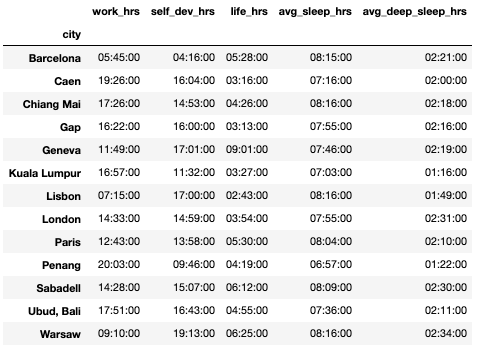
- The longest average total & deep sleep duration per week I had in Warsaw — 8:16hrs and 2:34hrs respectively. 我在華沙每周最長的平均總睡眠時間和深度睡眠時間分別為8:16hrs和2:34hrs。
- The shortest average deep sleep duration per week in Kuala Lumpur — 1:03hrs, and 吉隆坡每周平均平均深度睡眠時間最短-1:03hrs,以及
- Shortest total average sleep per week, in Penang — 6:57hrs. 檳城每周平均平均睡眠時間最短— 6:57小時。
Kuala Lumpur was very close to Penang both in the deep sleep and total sleep hours as well subjectivity ranking. (KL: 1:16hrs, 7:03hrs, 6.97, Penang: 1:22hrs, 6:57hrs, 6.57).
吉隆坡在深度睡眠和總睡眠時間以及主觀性方面都非常接近檳城。 (KL:1:16hrs,7:03hrs,6.97,Penang:1:22hrs,6:57hrs,6.57)。
🏙城市冠軍! (🏙 City winner!)
Of course, any conclusions about the cities are not linked to the cities per se, but rather to the specific life setup I had there—including the apartment, work and sleep stations, social life, and weather.
當然,關于城市的任何結論都與城市本身無關,而是與我在那里的特定生活設置有關,包括公寓,工作和睡眠站,社交生活和天氣。
It would be interesting to identify the conditions that created in the most promising locations. E.g. What did I have in Chiang Mai that was not the case elsewhere, which made my (impression of) productivity so much higher?
確定在最有希望的地區創造的條件將是很有趣的。 例如,我在清邁擁有什么,而其他地方卻沒有,這使我的(印象)生產力大大提高了?
Is the availability of Mo Bikes and easy access to mango sticky rice the key to productivity?!
Mo Bikes的可用性和容易獲得芒果糯米飯是生產力的關鍵嗎?
This is where I decided on the title of this post.
這是我決定該帖子標題的地方。
🧀加入奶酪! 我要感謝什么? (🧀 In for the cheese! What am I grateful for?)
Gratitude practice is a part of my weekly review*, and a great source of text data to analyse!
感謝練習是我每周評論的一部分*,也是分析文本數據的重要來源!
Why not a word cloud to display the most frequent words? 🤩 Who doesn’t like a good word cloud.
為什么詞云無法顯示最頻繁的單詞? 🤩 誰不喜歡一個好詞云。
Here is how you can do it. Skipping the part where I cleaned the column, nobody likes that bit.
這是您的操作方法。 跳過我清洗色譜柱的部分,沒有人喜歡。
Results:
結果:
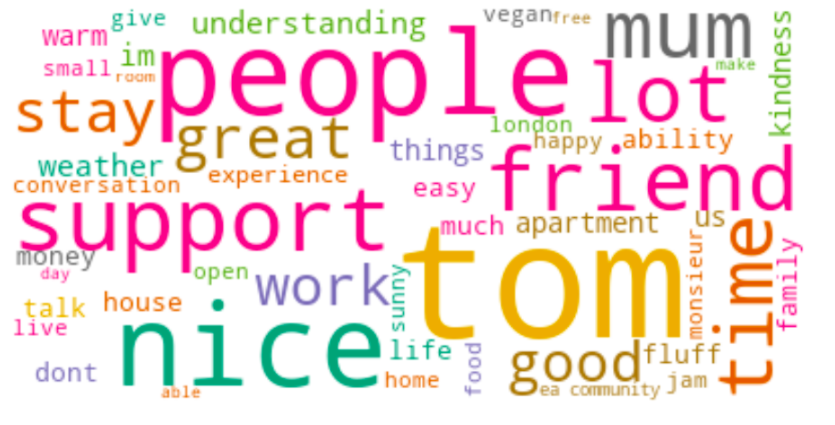
Clearly, and perhaps surprisingly for an introverted recluse like me, people-related terms take a prominent place on this cloud. Special mentions to mum, and Tom (my partner), and a shoutout to the EA community.
顯然,也許令人驚訝的是,對于像我這樣內向的人而言 , 與人相關的術語在這朵云上占有重要地位 。 特別向媽媽,湯姆(我的搭檔)提及,并向EA社區大喊大叫。
with我到底要做什么? (? What on earth do I do with my time?)
They say days are long, but months are short.
他們說日子很長,但是幾個月很短。
When you don’t pay attention days turn into a blur, especially in the 2020 lockdown times when every day is a Tuesday (or a Wednesday, as Tim Urban would have it).
當您不注意時,日子就會變得模糊,尤其是在2020年的鎖定時間,每天都是星期二(或Tim Urban會認為是星期三)。
Writing down stand-out events helps develop a habit of paying closer attention. It also helps appreciate each day more.
寫下杰出的事件有助于養成更密切注意的習慣。 它還可以幫助您每天更多地欣賞。
Let’s see what have been the most frequent stand out events for me.
讓我們看看對我來說最頻繁的脫穎而出的事件。
I do take into account that it’s a subjective report, comprised of what I managed to notice, remember at the end of the day, and decided to put down. Probably not fool-proof.
我確實考慮到這是一個主觀的報告,其中包含我設法注意到的內容,在一天結束時記得并決定放下。 可能不是萬無一失。
The code is the same as for the gratefulness cloud, just using a different data frame and column as a source of the text.
該代碼與感恩云相同,只是使用不同的數據框和列作為文本源。
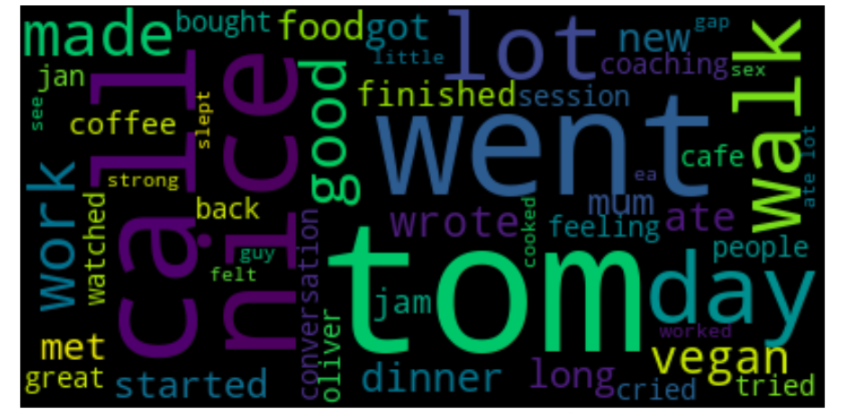
Unsurprisingly Tom again takes a prominent place. That’s I suppose what happens when you live with your partner — they are bloody everywhere, init! 😛
毫不奇怪,湯姆再次占據重要位置。 那就是我想,當您與伴侶一起生活時,會發生什么事- 他們到處都是血腥的,一開始! 😛
Talking (call, coaching, conversation) and walks (went, walk) are some of my most popular activities. Several specific people are also “standout events”, so to speak (Jan, Oliver, and Mum).
聊天(打電話,教練,談話)和散步(散步,散步)是我最受歡迎的活動。 可以這么說,幾個特定的??人也是“杰出事件”(Jan,Oliver和Mum)。
結論 (Conclusions)
What did I learn? Nothing groundbreaking. At least, there is no clear wow moment and an immediate actionable CTA. As many investigations, this one too ends with: more research needed!
我學到了什么? 沒什么突破性的。 至少,沒有明確的哇聲和立即可采取的CTA。 正如許多調查一樣,這一結果也以結尾: 需要更多的研究!
On the philosophical front, working the data in detail encouraged a deeper reflection about, for example:
在哲學方面,詳細處理數據鼓勵對以下方面進行更深入的思考:
- the difference between a feeling of productivity vs. length of time spent working, and 生產力感覺與工作時間之間的差異,以及
- prompts me to investigate more closely what exact life and sleep set up in specific locations (e.g. Warsaw) could have contributed to better sleep. 促使我更仔細地研究在特定位置(例如華沙)建立的確切生活和睡眠對改善睡眠的影響。
As next steps, I’ll probably run more consciously designed experiments. For example, eating mangos for 4 weeks to see if it impact my (perceived levels of) productivity. 😉
接下來,我可能會進行更有意識的設計實驗。 例如,吃芒果4周,看看它是否影響我的(感知水平)生產力。 😉
*I know what you want to say: I should note my gratitude daily. I’ll submit this motion to my IFS board.
*我知道你想說什么:我應該每天感謝我。 我將此議案提交至IFS董事會。
翻譯自: https://towardsdatascience.com/is-mango-sticky-rice-correlated-with-productivity-ad925959d858
芒果云接嗎
本文來自互聯網用戶投稿,該文觀點僅代表作者本人,不代表本站立場。本站僅提供信息存儲空間服務,不擁有所有權,不承擔相關法律責任。 如若轉載,請注明出處:http://www.pswp.cn/news/388317.shtml 繁體地址,請注明出處:http://hk.pswp.cn/news/388317.shtml 英文地址,請注明出處:http://en.pswp.cn/news/388317.shtml
如若內容造成侵權/違法違規/事實不符,請聯系多彩編程網進行投訴反饋email:809451989@qq.com,一經查實,立即刪除!








)


)
![[ BZOJ 4668 ] 冷戰](http://pic.xiahunao.cn/[ BZOJ 4668 ] 冷戰)


)


